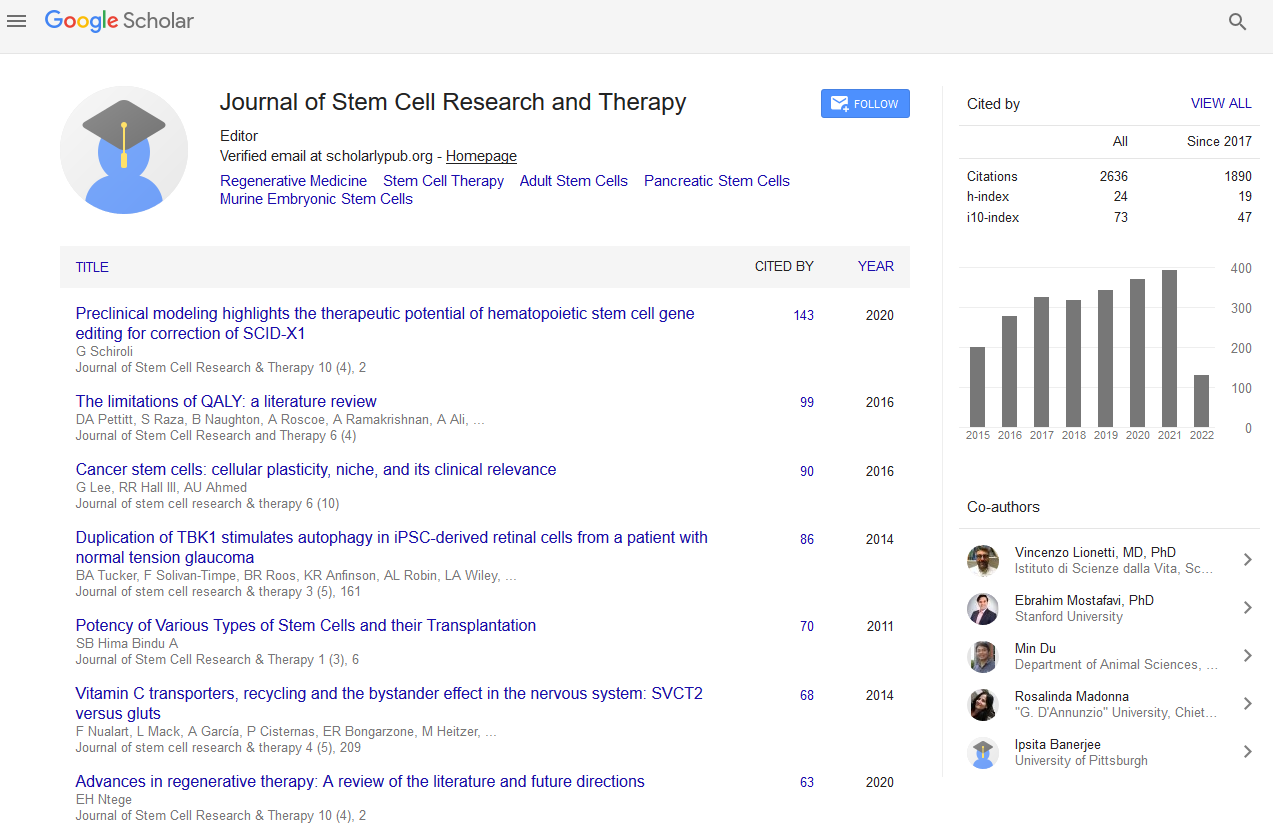Indexed In
- Open J Gate
- Genamics JournalSeek
- Academic Keys
- JournalTOCs
- China National Knowledge Infrastructure (CNKI)
- Ulrich's Periodicals Directory
- RefSeek
- Hamdard University
- EBSCO A-Z
- Directory of Abstract Indexing for Journals
- OCLC- WorldCat
- Publons
- Geneva Foundation for Medical Education and Research
- Euro Pub
- Google Scholar
Useful Links
Share This Page
Journal Flyer

Open Access Journals
- Agri and Aquaculture
- Biochemistry
- Bioinformatics & Systems Biology
- Business & Management
- Chemistry
- Clinical Sciences
- Engineering
- Food & Nutrition
- General Science
- Genetics & Molecular Biology
- Immunology & Microbiology
- Medical Sciences
- Neuroscience & Psychology
- Nursing & Health Care
- Pharmaceutical Sciences
Using small molecules for treatment of neorodegenrative disoders and cancer
International Conference on Regenerative & Functional Medicine
November 12-14, 2012 Hilton San Antonio Airport, USA
Thabe Matsebatlela
Scientific Tracks Abstracts: J Stem Cell Res Ther
Abstract:
Small molecules and trace elements provide a promising hub of resourceful agents in treatments of neurodegenerative diseases and cancer. One such molecule is 3,4-Dihydroxybenzohydroxamine (Didox). Didox is a simple, synthetic antioxidant and one of the most potent ribonucleotide reductase inhibitors, revealing an antitumor effect in several experimental studies. We have examined the effect of didox on the induction of oxidative stress in Raw 264.7 murine macrophage cell line. Using the Griess Reagent Assay, we showed that didox inhibited LPS-induced nitric oxide production without inducing cell death in these cell lines. The MTT assay assay revealed that cell viability was maintained and this was confirmed with Flow Cytometric evaluation using Propidium Iodide exclusion and Annexin-V FITC labels. Didox also inhibited LPS-induced H 2 O 2 production as assessed with dihydrodichlorofluorescein diacetate (CM-H 2 DCFDA) and this was confirmed using Fluorescence Microscopy Analysis. Didox also prevented the effect of Buthionine Sulfoxamine (BSO) and PMA-induced H 2 O 2 production in the cell lines and protected tributyltin-induced cytotoxicity in a dose dependent manner. Moreover, using the sandwich ELISA assay, we showed that Didox dose-dependently inhibited LPS-induced IL-6 production in Raw 264.7 cells. Didox also inhibited PCB126- induced cytotoxicity and H 2 O 2 production in Raw cells. Using the Real-time PCR system, we showed that Didox inhibited LPS- induced mRNA expression of iNOS, IL-6, IL-1, NF- κ B 1(p105), NF- κ B p65, Macrophage inflammatory proteins (MIP-1 α and β ), Caspases 1 and 8, and proapototic protein Bax. In addition, Didox inhibited both PMA and LPS-induced phagocytosis aof FITC-labeled beads. These results suggest that the pharmacological action of Didox is due to its potent anti-oxidative effects and anti-inflammatory effects, and that these actions are mediated via inhibition of the NF- κ B pathway. Didox may therefore play a major in managing disease conditions exacerbated by of LPS-induced oxidative stress in macrophage-mediated inflammation.


